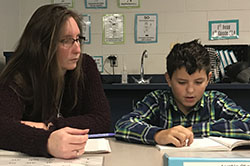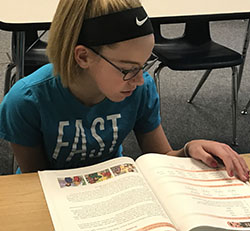Before beginning a lesson on weather and climate at Kraft Meadows Middle School, Anita Archer took a moment to talk to each of the two dozen middle school students who sat before her, one at a time. She asked for their names, shook their hands, and often commented on something unique about them.
Archer, an educational consultant, author and former teacher from Oregon, connected with each student five minutes into meeting them for the first time. Then she began teaching, repeatedly interweaving terms about the atmosphere into the lesson so the vocabulary, with a stress on pronunciation, would sink in.
Weather is exciting, she managed to convey, knowing students respond well to enthusiasm. She taught students about factors that affect weather and climate, having them repeat words with her during the lesson.
“Over time we would know what is making it hot and making it cold, and one thing is the what, everyone?”

“The latitude,” they said together.
“Next is the …” Archer paused.
“Altitude,” the class responded.
She asked the class questions and challenged students to “stand up and deliver” answers. They did, rising from their seats and speaking clearly about what they had learned. She listened to students “whisper read,” quietly reading passages so Archer had a sense of the student’s reading level.
She was modeling for teachers these instruction strategies: “Increase opportunities to respond in the class, front-load instruction with explicit vocabulary instruction, and constantly monitor students’ performance and adjust your lesson based on that performance.”
Caledonia, Williamston, Three Rivers, and Portage public schools middle school teachers watched Archer model strategies to increase students’ reading comprehension across all subject areas. The group met with her in August as well, beginning the work of Promoting Adolescent Reading Success at the seventh-grade level.
“The grant is really researching the impact of these specific strategies as it relates to adolescent reading success” across math, social studies and science, said Janel Switzer, curriculum director. “That’s the big thing — it’s not just happening in language arts class.”

Reading Strategies Across Subjects
PARS is part of an effort to incorporate reading strategies in Caledonia Public Schools, with a specific focus on the middle school years at Duncan Lake and Kraft Meadows Middle Schools.
Archer detailed the biggest takeaways she hopes teachers bring back to their classrooms: to increase opportunities for students to respond in class; add lots of vocabulary into instruction; constantly monitor how students are doing; and adjust their lesson based on what they are understanding.
Archer’s visit is just one piece of a system-wide effort at Caledonia to increase reading proficiency at all levels. PARS is a component of the district’s Multi-Tiered System of Support, a school-wide support system in reading and behavior. MTSS is supported by the Michigan Integrated Behavior Learning Support Initiative, a state and federally funded project for which Caledonia received a grant.
The district received a separate but connected four-year grant for PARS, which focuses on general education and special education students, through the U.S. Department of Education. Three entities in the U.S. were awarded the grant, including the Michigan Integrated Behavior Learning Support Initiative, which then chose Caledonia and two other districts in which to implement PARS.
A big part of the grant covers training, including Archer’s visits and an onsite coach who works with middle school staff. PARS training started with a core group of sixth-grade teachers, followed by the remaining sixth-grade teachers. The process began again with a core group of seventh-grade teachers and will continue until all teachers through ninth grade are trained.
The focus is addressing low proficiency in reading with strategies effective for all students.
“Can we figure out what we can do to close the gap involving secondary students who still struggle to read at this point?” said John Vail, a learning support coach. “It’s been a tough nut to crack.”

Reading ‘Faster and More Fluently’
In the Kraft Meadows resource room, teacher Jessica Smith is helping crack that nut. Sixth-graders recently used strategies during reading intervention to help them increase fluency, learn vocabulary by using words in several different ways, answer comprehension questions, and practice spelling.
“It gives us structure in what we’re doing,” said Smith, whose students carry forward their reading strategies into other classrooms.
“It helps me read faster and more fluently,” said sixth-grader Austin Stauffer. “It has helped me read my textbook in science and social studies. It helped me get my social studies grade up because I couldn’t read the textbook.”
CONNECT









